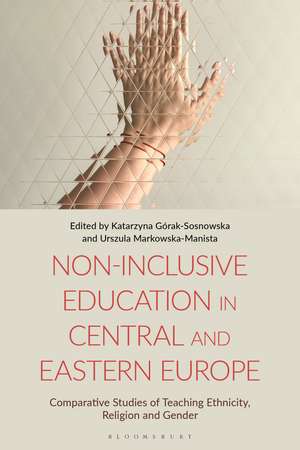Non-Inclusive Education in Central and Eastern Europe: Comparative Studies of Teaching Ethnicity, Religion and Gender
Editat de Katarzyna Górak-Sosnowska, Urszula Markowska-Manistaen Limba Engleză Paperback – 26 iun 2024
| Toate formatele și edițiile | Preț | Express |
|---|---|---|
| Paperback (1) | 191.48 lei 6-8 săpt. | |
| Bloomsbury Publishing – 26 iun 2024 | 191.48 lei 6-8 săpt. | |
| Hardback (1) | 539.90 lei 6-8 săpt. | |
| Bloomsbury Publishing – 30 noi 2022 | 539.90 lei 6-8 săpt. |
Preț: 191.48 lei
Preț vechi: 249.45 lei
-23% Nou
Puncte Express: 287
Preț estimativ în valută:
36.64€ • 37.86$ • 30.50£
36.64€ • 37.86$ • 30.50£
Carte tipărită la comandă
Livrare economică 25 martie-08 aprilie
Preluare comenzi: 021 569.72.76
Specificații
ISBN-13: 9781350325302
ISBN-10: 1350325309
Pagini: 248
Ilustrații: 10 bw illus
Dimensiuni: 156 x 234 x 25 mm
Greutate: 0.35 kg
Editura: Bloomsbury Publishing
Colecția Bloomsbury Academic
Locul publicării:London, United Kingdom
ISBN-10: 1350325309
Pagini: 248
Ilustrații: 10 bw illus
Dimensiuni: 156 x 234 x 25 mm
Greutate: 0.35 kg
Editura: Bloomsbury Publishing
Colecția Bloomsbury Academic
Locul publicării:London, United Kingdom
Caracteristici
Offer perspectives on inclusive education in Central and Eastern Europe which is an often-overlooked region in research about inclusive education
Notă biografică
Katarzyna Górak-Sosnowska is Associate Professor at the Institute of International Studies and Head of the Middle East and Central Asia Unit at SGH Warsaw School of Economics, Poland. Urszula Markowska-Manista is Assistant Professor in the Department of Education at the University of Warsaw, Poland.
Cuprins
Preface, Jaqueline Bhabha (Harvard University, USA) Introduction, Katarzyna Górak-Sosnowska (SGH Warsaw School of Economics, Poland) and Urszula Markowska-Manista (University of Warsaw, Poland)1. Intercultural Teaching in a 'Monocultural' Country: Why do we need a Decolonial Approach to Teaching about Diversity? Urszula Markowska-Manista (University of Warsaw, Poland)2. A Cultural History of the Other in Curriculum Design Transformation and Practice, Rafael Forteza Fernández (Ural Federal University, Russia)3. The Pluralist Paradigm in the Czech Educational Process: Teaching about Collective Identities and Democracy in the Constructivist Educational Project, Jan Kvetina (Czech Academy of Sciences, Czech Republic)4. Preparedness of Estonian Teachers to Tackle Extremism in a Classroom: a Systematic Review of Empirical Studies Published in Estonian Journal of Education (2013-2021), Alar Kilp (University of Tartu, Estonia) and Heidi Maiberg (Royal Holloway, University of London, UK)5. Are Muslims Scared of Pork? Teaching about Islam in Polish Schools, Katarzyna Górak-Sosnowska (SGH Warsaw School of Economics, Poland)6. Representations of Islam in the Romanian History Textbooks in the Post-1990 Period, Adriana Cupcea (Romanian Institute for Research on National Minorities, Romania)7. Othering Through Textbooks: Teaching about Roma in Contemporary Hungary, Jekatyerina Dunajeva (Hungarian Academy of Sciences, Hungary)8. Social Exclusion and the Construction of the Other in Czech Primary School, Radek Vorlícek (University of Hradec Králové, Czech Republic)9. Present But Absent: Education About the Roma Genocide in Poland, Joanna Talewicz-Kwiatkowska (University of Warsaw, Poland)10. Polish-Jewish Rivalry for Memory, Lech Nijakowski (University of Warsaw, Poland)11. Teaching Queer/Kvir Post-Soviet Perspectives: Intersectional Pedagogy and Global Knowledge Inequalities, Masha Beketova (Humboldt University Berlin, Germany)12. Teaching Gender and Queer Studies at Polish Universities: Challenges, Limitations, Perspectives, Magdalena Stoch (Pedagogical University of Krakow, Poland) Index
Recenzii
Non-Inclusive Education in Central and Eastern Europe is an important voice in the discussion of the shape and perspectives of religious discourse and inclusive education. It addresses the key problems and challenges faced by educators and teachers in Central and Eastern Europe nowadays and is an important point for reflection on cultures, religions, and educational policy.
This is a book that provides an extremely unique collection of voices sharing new knowledge and learning on approaches to inclusive education through the transformation of CCE states over the years.
This is a book that provides an extremely unique collection of voices sharing new knowledge and learning on approaches to inclusive education through the transformation of CCE states over the years.
